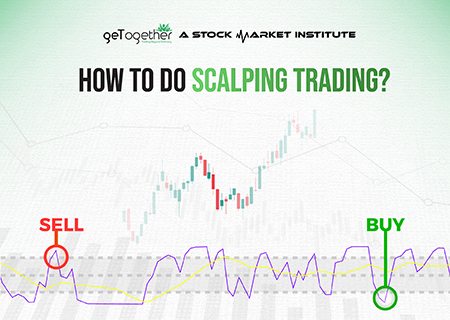How to do Scalping Trading?


In today’s time, traders do understand the importance of choosing the right trading style, as they know that without it they might end up losing their hard-earned money. Also, traders must choose their trading style according to their financial objectives, risk appetite, and time horizon. Are you also an intraday trader looking to earn higher profits in minimal time? In this blog, we will examine one of the unique trading styles named “scalping trading” which focuses on earning higher profits and especially for the traders who are involved in day trading.
Table of Contents
ToggleWho are Scalpers?
Scalpers are those traders who trade every day and in smaller successions. Every scalper follows a strict exit policy on their trades so that they can avoid a single large loss that can potentially escalate the small profits that they make. For successful scalp trading, traders should be disciplined, focused, and determined, the right qualities and tools can work wonders in helping an individual in becoming a scalp trader. Furthermore, the experience of the trader plays a very important role in this trading style as it helps scalp traders to execute various technical trading concepts and techniques for earning potential profits in the marketplace as a whole.
What is Scalp Trading?
Scalp trading, or scalping, is a fast-paced trading strategy where traders aim to profit from small price movements by making multiple trades throughout the day. Positions are held for a few seconds to a few minutes, with the goal of capturing tiny gains that add up over time. It requires quick decision-making, technical analysis, and a reliable trading platform.
Scalping Characteristics
Scalping is defined by quick, frequent trades that aim to capitalize on small price changes. It involves high trading volume, low profit per trade, and very short holding periods—often just seconds or minutes. Scalpers rely heavily on technical analysis, fast execution, and strict discipline to manage risk and avoid large losses.
How Scalping Trading Works?

Now that you know who scalpers are, you must be wondering how the scalping trading strategy works.
In simple terms, scalping trading refers to a short-term trading practice that includes buying and selling underlying assets single or several times during one single day to attain profit from rapid or small price movements. Scalp traders generally determine highly liquid assets that assure regular price alterations during the day because it is practically impossible to scalp if the assets aren’t liquidated.
Liquidity moreover assures that you only get the best price offers while entering and exiting the market. Scalpers recommend that making small deals is much easier and contains lower risks from the perspective of market volatility and they can easily attain small profits before really losing the opportunities. hence it is said that generating several profit opportunities during a small timeframe is better than awaiting a big one.
Here are the three primary principles that Scalpers work on:-
1. Decreased exposure limits risks-
Significant exposure in the marketplace reduces the probability of encountering an adverse situation.
2. Small moves are much more effortless to attain-
The price of the stock is totally dependent on the interaction between demand and supply in the market. So in order to earn significant profits scalpers catch smaller price moves that happen at regular intervals which are considered an easier catch for them.
3. Making significant profits from catching smaller ones-
Even when the market may not be doing good, scalpers try to find smaller opportunities for making bigger ones.
Scalp traders mainly center their attention on technical trading techniques such as demand-supply, risk management, and so on as compared to other trading styles. Technical analysis is the study of charts based on historical price movements, including keeping up with the current trends. They make use of these technical tools and charts for this and explore patterns to further predict future price action while fixing a deal. Furthermore, they utilize several time frames and trading charts and consider the one that is shortest among them, by the use of these timeframes of five minutes or even below, they attain 10 to 100 trades in one single day.
Benefits of Scalp Trading
Scalping trading is very popular among traders who are involved in day trading, here are some of the advantages of scalp trading:-
1. Quick profits:-
One of the primary benefits of scalping trading is to give traders quick profits. It is a strategy that only aims to make small profits on a large number of trades which means that traders can potentially make a significant amount of money in a short period.
2. High-frequency trading:-
When traders do scalp trading they make multiple trades in a short time which allows them to take advantage of short-term price movements and volatility in the market. This whole trading process is of high frequency and increases the chances of making a profit for scalpers.
3. Small capital requirement:-
Another advantage of scalping is that it can be done with a small amount of capital also. The goal of scalp traders is to make small profits on many trades with smaller positions which is beneficial for traders who have limited capital and are finding ways to make the most out of it.
4. Low-risk:-
Scalping strategy is considered a low-risk strategy as it opens for a short time, usually for a few minutes which means that traders can limit their overall losses by quickly closing a trade if the market goes down. Moreover, for minimizing the risk in scalping, traders can also use stop-loss orders to limit potential losses.
5. Constant action:-
The traders who enjoy the fast-paced action of the markets can take advantage of market movements in scalping. It keeps traders engaged and active in the market which makes them more alert and responsive towards the market.
Also Read: Momentum Trading
Scalping Strategies
Scalping strategies can be highly effective when based on demand and supply zones. Traders use a top-down approach, starting with higher time frames (like daily or hourly charts) to identify key support (demand) and resistance (supply) zones, then zoom into smaller time frames like 3–5 minutes for precise entry and exit points. This method helps in spotting quick price reactions at critical levels, allowing scalpers to capture short-term gains with better accuracy.
Example of Scalping
A trader spots a demand zone around ₹950 on the 1-hour chart. They then move to the 3-minute chart and observe how the price behaves as it approaches ₹950. If the price forms a bullish pattern or rejection wick in this zone, the trader enters a buy trade. The stop-loss is placed just below the demand zone (e.g., ₹948), and the target is set based on a nearby supply zone or a small risk-to-reward ratio like 1:1.5 — aiming for a quick profit within a few minutes.
Conclusion
If you are a trader interested in day trading, you should educate yourself about scalping. Scalping can be very profitable for traders who decide to use it as a primary strategy, or even those who use it to supplement other types of trading with it. Focusing on the strict exit strategy is the key to making small profits compound into large gains and the frequency of small moves are key attributes that are the reasons why this strategy is popular.
FAQs
1. Is scalping trading suitable for beginner dealers?
Scalping trading is best for professional traders who are knowledgeable in risk management, market trends, and technical analysis. It could be challenging for novice traders to execute fast trades effectively.
2. Is it conceivable to utilize scalping in any financial market?
Scalping trading can be utilized in stocks and commodities, among other monetary business sectors. Nevertheless, liquidity and volatility are significant considerations.
3. How much time do I need to devote to scalping?
Scalping trading requires speedy independent direction and dynamic market observation. Traders need to be prepared to devote sufficient time and focus to execute trades effectively.
4. How is intraday trading different from scalping trading?
Scalping trading revolves around exceptionally short trades to catch minute cost changes. intraday trading includes keeping positions open for a day or more to get greater cost swings.
5. What are the risks of scalping trading?
High transaction costs, exaggerated market movements, and lengthy execution times are all inherent risks of scalping trading.
CATEGORIES



 Facebook
Facebook Instagram
Instagram Youtube
Youtube
